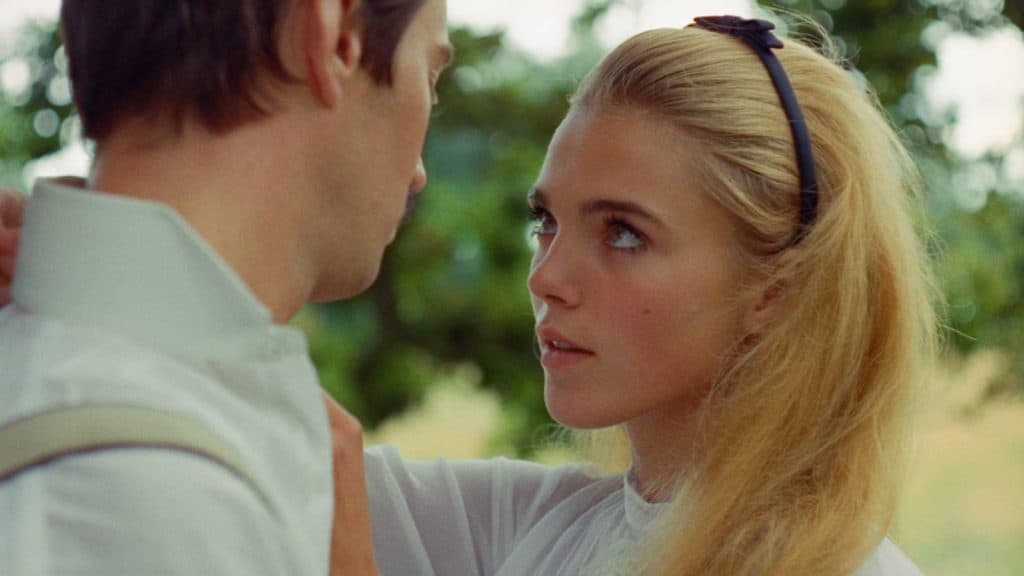Driven by a desire to forge a socially conscious Swedish cinema—one that broke with the inward-looking psychodrama of Ingmar Bergman to give dynamic expression to the everyday experiences of working-class Swedes—writer Bo Widerberg turned to filmmaking in the early 1960s, realizing his ambition in politically committed yet poetic works that merge social-realist themes with a refined, often breathtakingly beautiful visual sensibility. Dramatizing the struggles of ordinary people fighting to chart their own destiny, these four acclaimed, popular, and pivotal films from Widerberg’s most prolific period live and breathe with a rare vitality—and helped launch a new Swedish cinema.
The Baby Carriage – Infused with a jazzy, nouvelle vague–inspired energy, Bo Widerberg’s feature debut has the freshness of youth. Building on his film criticism’s call for a socially relevant Swedish cinema, the writer turned director offers a vivid portrait of a young factory worker (Inger Taube) finding her way toward independence as she weathers unexpected pregnancy, learns hard lessons from relationships with two very different men, and leaves behind the only home she has ever known. Abetted by fellow filmmaker Jan Troell’s coolly beautiful monochrome cinematography, Widerberg takes a bold first step in his mission to create a cinema that is both engaged and engaging.
Raven’s End – A period piece that forgoes nostalgia in favor of a stark examination of working-class struggle, Bo Widerberg’s second feature unfolds in 1936 in the director’s hometown of Malmö. It’s there, in the poor district of Raven’s End, that young Anders (Widerberg’s regular collaborator Tommy Berggren) chases his dream of becoming a writer while growing increasingly disillusioned with the dead-end world that surrounds him: an alcoholic father, a toiling mother, and the ominous specter of Nazism. Delivering a bracing jolt of kitchen-sink realism to Swedish cinema, Widerberg paints an unsparing portrait of youthful idealism bumping up against economic despair.
Elvira Madigan – Bo Widerberg reached new heights of visual lyricism with this sublime retelling of a real-life nineteenth-century romantic tragedy. Bound by their all-consuming desire, a young circus tightrope walker (Pia Degermark, winner of the Cannes Film Festival’s Best Actress prize) and a lieutenant (Tommy Berggren) with a wife and children forsake everything to be together and escape to the countryside—only to see their lovers’ idyll gradually give way to poverty and desperation. With its painterly, sun-dappled images and indelible use of Mozart’s Piano Concerto no. 21, this 1960s art-house sensation is the most ravishing expression of Widerberg’s recurring theme of the tension between individual freedom and social responsibility.
Ådalen 31 – One of Bo Widerberg’s most explicitly political works imbues the true story of a 1931 labor strike with a powerful contemporary resonance. In the industrial district of Ådalen, in the north of Sweden, a peaceful demonstration takes a tragic turn, leading to a historic general strike. Amid these events, the teenage Kjell (Peter Schildt) experiences sacrifice and strife, love and loss, and the consequences of this shocking violence. Working once again with Elvira Madigan cinematographer Jörgen Persson—who captures shimmering, light-filled images in graceful widescreen—Widerberg entwines a stirring portrait of resistance with an intimate coming-of-age journey for a vision of history that feels vibrantly, urgently alive.
For thoughts on Bo Widerberg’s New Swedish Cinema, please check out our discussion on The Video Attic:
[youtube https://youtu.be/-AF7quHixtY?t=747]
Video Quality
Bo Widerberg’s New Swedish Cinema comes to Blu-Ray with new digital AVC encoded 1080p restorations for all four films on four individual discs. All four of these films provide an ideal viewing experience that fans are sure to appreciate.
First up is the debut film The Baby Carriage, which is presented in its original 1.33:1 courtesy of a new master derived from the 35mm Original Camera Negative. This is the only film not noted as coming from a 2K or 4K scan, but you would never judge it as being of lesser quality as the other three films in the set. This and Raven’s End are presented in black-and-white, and the luminous nature of the cinematography is represented favorably. The delineation in contrast is always strong with black levels staying firm and highlights never succumbing to bloom. The source does not showcase anything in the way of notable damage, and the transfer does allow for some texture to shine through from the clothing and production design.

The remaining three films are somewhat interchangeable in a good way in terms of providing top shelf quality for audiences. Raven’s End (1.37:1 OAR) and Ådalen 31 (2.39:1 OAR) are both provided thanks to 4K scans of the 35mm Original Camera Negative and a Duplicate Negative. Elvira Madigan (1.66:1 OAR) gets a 2K scan of solely the 35mm Original Camera Negative. Stylistically, Widerberg evolves slightly with Elvira Madigan standing as his most visually sumptuous endeavor, but they all have their places. The presentations are as close to pristine as you could possibly wish for, as the new scans look quite excellent throughout each film. There were no observable instances of print damage, and overall clarity and detail is magnificent.
The picture holds up extremely well in all environments from the dingy projects of Raven’s End to the wide open expanses of nature in Elvira Madigan. Colors are rich and well saturated for the latter two films in the set in a visually stunning manner. Black levels hold up well with virtually nothing in the way of crush. Skin tones are natural and consistent with subtle facial features easily noticeable in closeup. There does not appear to be any amount of digital noise due to compression limitations or other such nuisances thanks to the careful allocation of disc space. This new collection is top-tier quality from beginning to end and should please any fan of the director.

Audio Quality
The Blu-Ray set comes with a remastered LPCM 1.0 mono track for each of these four films in the original Swedish with optional English subtitles. Dialogue comes through clearly for the most part with no major hints of distortion or other weak elements. The music implemented within each feature sounds great throughout the set with firm fidelity. There is never a moment where it threatens to overwhelm any dialogue. Environmental sounds such as animal noises or weather effects are rendered well alongside everything else. There does not seem to be any majorly noticeable instances of age-related wear and tear. The Criterion Collection has given this collection the perfectly preserved, faithful audio presentation it deserves.
 Special Features
Special Features
The Criterion Blu-Ray of Bo Widerberg’s New Swedish Cinema includes a substantial booklet featuring the essay “Another Sweden” by film critic Peter Cowie in which he delves into the career of Bo Widerberg, individual thematic breakdowns of each film and much more that is very illuminating. There are also some written archival pieces from Widerberg included that reveal his thoughts on numerous different subjects. The on-disc special features are as follows:
The Baby Carriage
- Ruben Östlund: A 15-minute interview with director Ruben Östlund (Triangle of Sadness) who discusses how Widerberg inspired his mentor Kalle Boman, Widerberg’s impact on Swedish cinema, what he has taken from the work of Widerberg and more that is very enlightening.
- The Boy and The Kite: The 30-minute debut short film from Bo Widerberg is presented here which focuses on a young boy whose birthday gets overlooked in the chaos of an especially busy day. This was codirected and shot on 16mm by filmmaker Jan Troell, and it is beautifully restored here. There is an option to watch a two-and-a-half minute introduction from Troell who discusses his relationship with Widerberg.
- Bo Widerberg: A minute-and-a-half interview from 1963 is provided in which Widerberg discusses the state of Swedish cinema and his debut film.

Raven’s End
- Tommy Berggren: A 19-minute interview with actor Tommy Berggren from 2021 who discusses his friendship with Widerberg, his work on The Baby Carriage, the intimate nature of his filmmaking, the incorporation of political issues into his work, the visual majesty of his work and more.
- Bo and Nina Widerberg: A seven-minute interview from 1963 for Swedish television in which Bo Widerbeg and his three-year-old daughter Nina discuss the motivations behind the film, what he wanted to accomplish as a director, the themes of the story and more.

Elvira Madigan
- Jörgen Persson: A 21-minute interview with cinematographer Jörgen Persson conducted in 2021 in which he discusses first meeting Bo Widerberg, going against certain conventions to achieve specific aesthetics, attempting to film with natural light as much as possible, memories of the performers, the directorial style of Widerberg and more.
- Bo Widerberg: A piece from 1967 in which a group of children interview Widerberg about Elvira Madigan in which he discusses some of the thematic elements of the story, how he came up with the idea for the film, details about filming certain scenes and more.
- Behind The Scenes: A minute-long fly-on-the-wall look at the production of the film with narration.

Ådalen 31
- Bo Widerberg and Hjalmar Näsström: A nearly five-minute television program from 1968 in which labor-union chairman Hjalmar Näsström discusses the reality of the 1931 Adalen riots before Widerberg begins discussing why he is so passionate about telling this important story from his country’s history.
Final Thoughts
Bo Widerberg’s New Swedish Cinema allows for audiences with less familiarity with Swedish cinema outside of Ingmar Bergman to get a crash course on one of the greats. The four films are stylistically and narratively distinct, yet at the same time they feel like a vital piece of a cohesive whole. Whether you want something more raw and personal like The Baby Carriage or reflective of larger societal issues like Ådalen 31, Widerberg is here to find the nuances and complexities of each narrative. The Criterion Collection has released a Blu-Ray set that features the films with a stunning A/V presentation and an excellent assortment of in-depth special features. For Swedish film fans or just those willing to immerse themselves in an eclectic grab bag of international cinema, this release is stellar. Recommended
Bo Widerberg’s New Swedish Cinema will be available to purchase on Blu-Ray on August 22, 2023.
Note: Images presented in this review are not reflective of the image quality of the Blu-Ray.
Disclaimer: The Criterion Collection has supplied a copy of this disc free of charge for review purposes. All opinions in this review are the honest reactions of the author.

Dillon is most comfortable sitting around in a theatre all day watching both big budget and independent movies.






